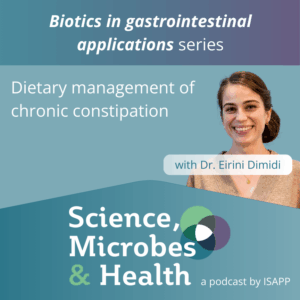Can prebiotics benefit brain health in older adults? ISAPP experts weigh in on a recent study

With increasing age and frailty come changes in the gut microbiota – leading scientists to ask whether targeting the gut microbiota using prebiotics could contribute to healthier aging. Of particular interest is whether prebiotics have the potential to affect brain health and cognitive performance in older adults.
An intervention study led by researchers at King’s College London (UK) explored prebiotics’ effects on both physical health and cognition in older adults. In the study, 72 adults (twin pairs) aged 60 and up consumed either a prebiotic supplement or a placebo every day for 12 weeks. The prebiotic supplement contained a mixture of inulin and fructo-oligosaccharides (FOS) totalling 7.5 grams. All participants also did resistance exercises and took a supplement containing protein components (branched-chain amino acids, or BCAAs).
The results were promising: while participants in both groups overall showed improvements in their physical strength (as measured by chair rise time), the individuals in the prebiotic group performed better than the placebo group on cognitive tests (from a computer-based battery of tests called the CANTAB) measuring executive function and memory. The result is consistent with the idea that prebiotics benefit brain health in some situations.
Two ISAPP board members and prebiotic experts, Dr. Anisha Wijeyesekera PhD and Prof. Kristin Verbeke PhD, give their perspectives on this area of research and what’s added by this recent study.
Why are prebiotics of interest for benefits to brain health?
 Wijeyesekera: There is growing evidence (and interest) in the link between the gut and the brain. There are several health conditions such as irritable bowel syndrome and autism spectrum disorder where this gut-brain link is evident, as patients experience symptoms that relate to both gut and brain health. Hence, for many researchers, gut microbiota targeted dietary interventions such as prebiotics and probiotics offer an approach to improve health outcomes such as cognitive function through targeted modulation of the gut microbiota.
Wijeyesekera: There is growing evidence (and interest) in the link between the gut and the brain. There are several health conditions such as irritable bowel syndrome and autism spectrum disorder where this gut-brain link is evident, as patients experience symptoms that relate to both gut and brain health. Hence, for many researchers, gut microbiota targeted dietary interventions such as prebiotics and probiotics offer an approach to improve health outcomes such as cognitive function through targeted modulation of the gut microbiota.
What’s known about the mechanisms by which prebiotics might improve cognition?
Wijeyesekera: This is still being studied but most likely the production of microbial metabolites (such as short-chain fatty acids, or SCFAs) are playing a crucial role here. These microbially derived small molecules enter into host physiological processes, resulting in altered metabolic mechanisms that may be contributing to the changed health outcomes.
 Verbeke: The mechanisms for gut-brain signaling have been studied mainly in in vitro and animal studies. Several potential pathways have been proposed, including metabolic (SCFA production that affects the hypothalamic-pituitary-adrenal axis), endocrine (microbial production of neurotransmitters and hormones), immune (release of anti-inflammatory mediators) or neural (vagus nerve stimulation) signaling. It is hard to say whether they are all equally important in humans or whether one of those mechanisms is primary. We assume it is a combination of all those effects.
Verbeke: The mechanisms for gut-brain signaling have been studied mainly in in vitro and animal studies. Several potential pathways have been proposed, including metabolic (SCFA production that affects the hypothalamic-pituitary-adrenal axis), endocrine (microbial production of neurotransmitters and hormones), immune (release of anti-inflammatory mediators) or neural (vagus nerve stimulation) signaling. It is hard to say whether they are all equally important in humans or whether one of those mechanisms is primary. We assume it is a combination of all those effects.
In the current study, do you think the protein intake and exercise were necessary for the beneficial effects?
Verbeke: I assume that the protein (BCAA) supplement and the exercising was intended to improve the muscle strength, which was the primary outcome of the study. Indeed, the chair rise time improved in both groups but the prebiotic did not confer an additional benefit. With respect to cognition, there was a slight effect in the placebo group that only received the protein/exercise(although it is not indicated whether that difference is statistically significant) but addition of the prebiotic significantly increased the effect. So if the effect of protein/exercise alone was not significant, the result would have been the same without that intervention; if the effect was significant, the effect of prebiotic alone might have been a bit smaller but would probably still be there.
A combination of inulin and FOS were used in the study. Do you think a different type of prebiotic would have had the same results?
Verbeke: As long as we do not know the exact working mechanism, it is hard to predict what the effect of a different prebiotic would be. I do not expect that other prebiotics would have no effect at all but the extent of the effect may (slightly) differ from one prebiotic to another. For instance, it is possible that a prebiotic that yields a different ratio of SCFA upon fermentation may have a different effect, or that a prebiotic that more selectively stimulates bacteria secreting different amounts of neurotransmitters such as GABA may also have a different effect.
What are some gaps in what researchers know about how prebiotics affect brain function?
Wijeyesekera: It would have been great if the metabolic phenotypes had also been characterised in the study, as this would be able to identify alterations to metabolic pathways as a result of the intervention. This may shed more light on the activity of the microbes that were identified to have been altered as a result of the intervention, and also the impact of the protein and exercise in general on metabolic mechanisms.
Verbeke: The effect of prebiotics/fiber on cognitive function is likely confounded by a number of individual host factors such as the baseline diet, age, lifestyle, and baseline cognitive function level. We need much more research to understand the interaction between all these factors and to be able to identify the people that would benefit most from a prebiotic/fiber intervention.



